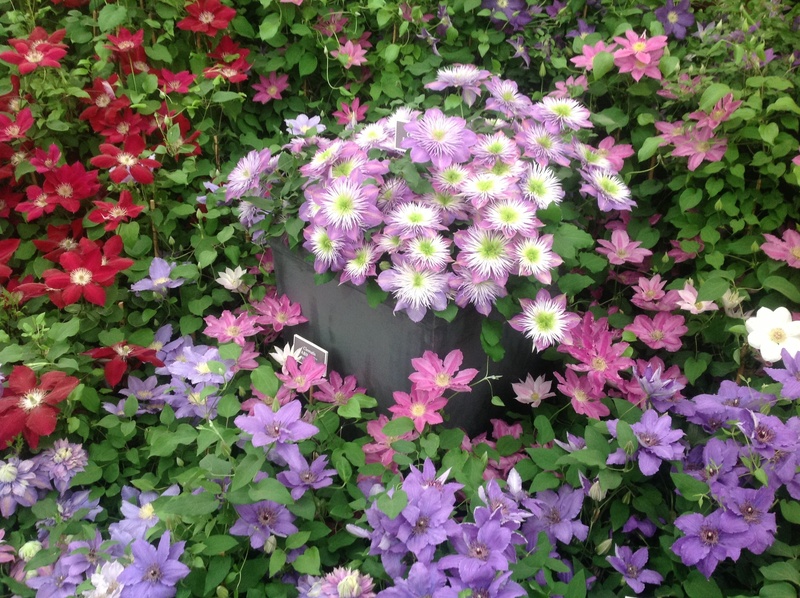Secrets to Successfully Cultivating a Lush Herb Garden
Posted on 22/06/2025
Secrets to Successfully Cultivating a Lush Herb Garden
Have you ever dreamed of stepping outside your door to snip fresh basil for pasta, or mint for a cool summer drink? Learning the secrets to successfully cultivating a thriving, lush herb garden can turn your garden dreams into reality. Whether you're a beginner with a windowsill pot or an experienced gardener seeking to elevate your home-grown herbs, this comprehensive guide reveals expert tips, practical steps, and common pitfalls to avoid. Join the countless gardeners who have uncovered the joy and benefits of growing an abundant herb garden at home!
Why Grow Your Own Herb Garden?
- Freshness: Nothing beats the flavor of herbs freshly snipped from your own garden.
- Cost-effective: Grow once, and harvest for months. Stop buying expensive, quickly wilting herbs from the store.
- Health Benefits: Many herbs are packed with antioxidants and essential nutrients.
- Visual Appeal: Herb gardens can be as beautiful as they are functional--adding color, fragrance, and texture to your living space!
- Eco-Friendly: Reduce packaging waste and your carbon footprint.

Choosing the Right Location for Your Herb Garden
The foundation of cultivating a lush herb garden lies in the right location. Herbs thrive when you find a spot with the ideal conditions. Follow these proven secrets to set your herb garden up for success:
1. Sunlight is Key
- Most herbs require at least 6 to 8 hours of direct sunlight daily. Popular herbs like basil, rosemary, thyme, and oregano love full sun.
- For apartments or homes with limited sunlight, grow shade-tolerant herbs such as mint, parsley, and chives, or consider using grow lights indoors.
2. Accessibility for Frequent Harvests
- Position your herb garden close to the kitchen or main living area.
- Ease of access encourages regular use and maintenance!
3. Ideal Soil Conditions
- Well-draining soil is essential. Herbs usually dislike wet roots. If the garden soil is heavy clay, amend with compost and sand.
- Use quality organic potting mix for container herb gardens.
Selecting the Best Herbs for Your Garden
Success starts with choosing the herbs that best match your climate, cooking preferences, and available space. Some herbs are exceptionally easy for beginners:
- Basil: Thrives in warmth, ideal for Italian dishes.
- Mint: Hardy, tolerant of partial shade. Best in containers to prevent spreading!
- Rosemary: Woody, drought-resistant, fantastic for grilling and roasting.
- Thyme: Low-growing and tolerant, perfect for borders or ground cover.
- Parsley: Biennial, easy to grow, packed with vitamins.
- Cilantro: Grows quickly, needs cooler temperatures.
- Chives: Great for garnishes, tolerates a range of conditions.
Consider starting with herbs you use most frequently in the kitchen. This adds immediate value while you learn the art of cultivating lush, healthy plants.
Secrets to Planting and Growing a Lush Herb Garden
Successful Seeding and Transplanting
- Many annual herbs (basil, cilantro, dill) grow well from seeds sown directly as the soil warms in spring.
- For perennials (mint, rosemary, thyme), buy young plants or root cuttings from a reputable nursery.
- Space herbs according to their mature size to allow for good air circulation and lush development.
Soil Preparation: The Secret to Healthy Roots
- Mix compost or worm castings into planting beds to provide herbs with nutrients and improve soil structure.
- Maintain a slightly sandy, loose soil for Mediterranean herbs (rosemary, thyme, oregano).
- For potted herb gardens, use containers with proper drainage holes and fill with high-quality, well-draining potting mix.
Watering Wisely
- Check soil moisture with your finger before watering. Water herbs thoroughly but infrequently--allow soil to dry slightly between waterings.
- Avoid overwatering: This is the most common mistake!
- Early morning is the best time to water; evening watering can promote fungal issues.
Fertilizing for a Flourishing Herb Garden
- Light feeders: Most herbs don't need heavy fertilization. Too much fertilizer can lead to lush leaves with weak flavor.
- Feed soil, not the plants: Apply a balanced, organic slow-release fertilizer or side-dress with compost every month during the growing season.
The Importance of Pruning and Harvesting
Regular pruning and harvesting is a top secret to encouraging dense, bushy growth in your herb garden. Here's how:
- Pinch back: Trim the tips of your herbs regularly to promote branching.
- Harvest frequently: Remove up to a third of the plant at a time--this signals herbs to produce new growth.
- Avoid letting annual herbs flower (bolt), as this can make leaves bitter. Pinch off flower buds on basil, cilantro, and parsley.
Secrets to Lush Growth: Mulching, Pests, and Disease Control
Mulching for Moisture and Health
- Apply a thin layer of mulch (straw, shredded leaves, or bark) around herbs to retain moisture, suppress weeds, and protect roots.
- Leave space around stems to prevent rot.
Pest and Disease Management
- Grow healthy, stress-free plants by providing the right conditions--most pests avoid robust herbs.
- Encourage beneficial insects, such as ladybugs, by avoiding broad-spectrum pesticides.
- Use companion planting--grow basil near tomatoes, or chives near carrots, for natural pest resistance.
- If problems occur, remove affected leaves, use neem oil sprays, or try organic solutions like insecticidal soap.
Herb Garden Secrets for Indoor and Container Growing
Don't have outdoor space? You can still cultivate a lush, vibrant herb garden indoors or in containers!
Choosing Containers
- Select pots with drainage holes to prevent soggy soil.
- Choose sizes appropriate for the herb--basil, dill, and cilantro need deeper pots, while thyme and oregano are happy in shallower containers.
Lighting Solutions for Indoor Herb Gardens
- Place pots on a sunny windowsill with southern or eastern light.
- If natural light is insufficient, supplement with full-spectrum grow lights set 6-12 inches above plants.
Arranging Your Container Herb Garden
- Group herbs with similar water and light needs for the healthiest growth.
- Consider attractive arrangements using vertical planters, hanging baskets, or window boxes for space-saving solutions.
Maintaining and Troubleshooting Your Herb Garden
Cultivating a lush herb garden is a practice, not a single act. Use these secrets to foster continued success:
- Monitor regularly: Check herbs for signs of stress, pests, or disease and act early.
- Refresh soil annually: Especially important in containers to avoid nutrient depletion.
- Rotate crops: If gardening in beds, rotate types of herbs each year to prevent soil-borne diseases.
- Replace perennials as needed: Woody herbs may need to be replaced every few years for best productivity.
Common Mistakes and How to Avoid Them
- Overwatering: The number one killer of herbs. Let soil dry a bit before next watering.
- Overcrowding: Give each plant sufficient space to grow and air to circulate.
- Choosing the wrong location: Herbs deprived of sunlight become leggy and flavorless.
- Neglecting to prune: Failing to harvest stunts productivity and encourages flowering (bolting) in annuals.
- Too much fertilizer: Leads to rapid but weak, tasteless growth--use sparingly!
Harvesting, Drying, and Preserving Herbs for Year-Round Enjoyment
A true secret to maximizing your lush herb garden? Continued harvest and proper preservation!
How to Harvest Herbs Properly
- Harvest in the morning after the dew dries but before the heat of the day, when essential oils are at their peak.
- Use clean, sharp scissors or snips to avoid damaging plants.
- Leave enough leaves behind for the herb to continue growing vigorously.
Drying and Storing Herbs
- Remove lower leaves and tie herbs in small bunches. Hang upside down in a warm, dry, well-ventilated area out of direct sunlight.
- You can also use dehydrators or oven-drying at a low temperature (90-100?F / 32-38?C).
- Store dried herbs in airtight containers away from light for maximal flavor retention.
Freezing Herbs for Freshness
- Chop herbs and freeze in ice-cube trays covered with olive oil or water--great for soups and stews all year long.

Design Tips for a Beautiful Herb Garden
In addition to being functional, herb gardens can be beautiful focal points. Here are a few design secrets:
- Plant in geometric patterns or raised beds for structure.
- Mix perennial and annual herbs for seasonal interest.
- Add edible flowers (nasturtiums, calendula) for added color and pollinator attraction.
- Incorporate paths or stepping stones for easy movement and visual appeal.
Conclusion: Enjoy the Abundance of Your Lush Herb Garden
Whether you have a sprawling backyard or a solitary windowsill, the secrets to cultivating a lush herb garden are within your grasp. By selecting the right location, providing ideal soil and water conditions, harvesting regularly, and watching for pests, you'll soon enjoy the rich flavors and fragrances that only fresh herbs can deliver. Start small, learn as you grow, and delight in the bounty of your own homegrown herb garden--your garden-to-table journey starts today!
FAQs: Lush Herb Garden Success
- What's the easiest herb to grow? Mint is one of the easiest, but keep it contained!
- Can I grow herbs all year? Many herbs grow indoors year-round with sufficient light. Hardy herbs like rosemary and thyme can survive mild winters outdoors.
- Do herbs need fertilizer? Minimal amounts help, but over-fertilizing can reduce flavor. Compost is usually enough!
- How often should I water? Let the soil dry slightly between waterings. Most herbs prefer "less is more."
Ready to unlock the lush, green potential of your own herb garden? Let the secrets in this guide inspire you to begin growing today!
Latest Posts
Begin Your Garden's Revival with These Steps
Calm the Storm: Effective Strategies for Windy Gardens
Mastering the Craft of Hedge Trimming: Shapes and Techniques
Top Gardening Tools Every Outdoor Lover Needs
Breathing New Life into Waste: Creating Nutrient-Packed Soil

